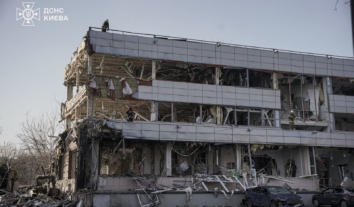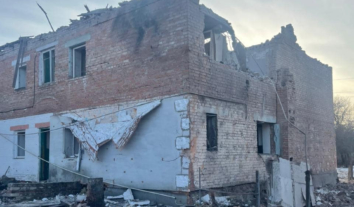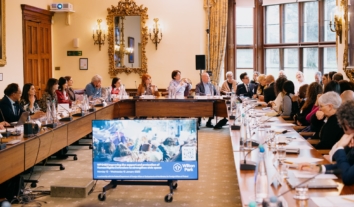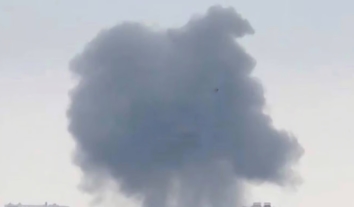Fifty-six-year-old man dies in hospital after being injured by Russian drone in Kherson Oblast
A 56-year-old man died in hospital on January 22 after suffering injuries in a Russian drone attack in the Kherson Oblast on January 21, 2025.
Oleksandr Prokudin, head of the Kherson Oblast Military Administration, conveyed condolences to the family and friends of the deceased. He also reported that three more people were injured on January 21. Doctors are fighting to save the life of a seriously wounded woman, while two men suffered moderate injuries.
The Kherson Oblast Military Administration reported that Russian forces conducted airstrikes on settlements in the region over the past day. The attacks damaged two high-rise buildings and seven houses. Additionally, the strikes damaged a gas pipeline and several cars. One person died, and 11 others sustained injuries.
By way of background, Russians killed a 24-year-old man during artillery shelling of the village of Chervonyy Maiak in the Kherson Oblast on January 19, according to Prokudin.
On January 19, the Kherson Oblast Military Administration and City Military Administration reported that a 59-year-old man in the city of Kherson stepped on a petal anti-personnel mine at a bus stop. The blast severed his foot, and he was hospitalised in serious condition.
It is known that the Russian forces are employing a new and insidious mining tactic on the Kherson front, using PFM-1 landmines. As the Ukrinform news agency reported, according to Ukrainian defence spokesperson Vladislav Voloshyn, these plastic mines containing liquid explosives are particularly dangerous because they are difficult to detect using conventional mine-detection equipment.
The Russian military has developed sophisticated camouflage techniques for these mines, making them extremely hard to identify. Soldiers are now coating the mines with glue and covering them with dirt, small stones, and debris, effectively disguising them as ordinary objects. They also wrap the mines in rags or camouflage netting, blending them into the surrounding environment.
In an attack on the village of Antonivka in the Kherson Oblast, Russians killed a 56-year-old nurse from a local outpatient clinic on January 15, Prokudin reported.
Russians killed a 52-year-old man and a 68-year-old woman in its attack on the settlement of Beryslav in the Kherson Oblast on the afternoon of January 18, according to Oleksandr Prokudin, head of the Kherson Oblast Military Administration.
On January 17, Russian strikes on the Kherson Oblast left one civilian dead and five others injured. The attacks targeted critical and social infrastructure, as well as residential areas, damaging 23 houses. Gas pipelines and garages were also affected by the bombardments.
Prokudin reported that Russian forces launched a UAV attack on Antonivka at midnight on January 15-16. The Russian strike killed a 37-year-old local resident. Another man, 33, suffered blast injuries, including shrapnel wounds to his legs and a head concussion.
Previously, Prokudin also reported that Russian forces had targeted Kherson and 36 other settlements in the oblast within the past 24 hours. They attacked social infrastructure facilities and residential areas, damaging a high-rise building and 12 houses. The strikes also destroyed a gas pipeline, an outbuilding, garages, and cars. Seven people sustained injuries from the Russian aggression.
On January 13 at 12:00, a drone attack injured a 42-year-old woman in Antonivka. According to Roman Mrochko, head of the Kherson City Military Administration, the woman was in critical condition with blast and shrapnel wounds.
On January 11, the Kherson Oblast Military Administration reported that Russians seriously injured a 44-year-old man in Zmiivka in a Russian UAV attack on Kherson Oblast. Another 33-year-old civilian was also injured in Antonivka that day.
At 8:30 am on January 9, Russians killed a woman in the village of Nezlamne in the Kherson Oblast, according to Oleksandr Prokudin. The official elaborated that a woman who had been on the street had sustained fatal injuries due to the FPV drone attack.
A day earlier, on January 8, Prokudin reported that a 27-year-old man died in a Russian UAV attack on Beryslav, the Kherson Oblast.
A 71-year-old man was killed as a result of a Russian attack on the village of Naddniprianske at around 10:40 am on January 8, in the Kherson Oblast, according to Prokudin.
On the same day, Russians dropped explosives from a drone on Beryslav, injuring a 66-year-old man and a 69-year-old woman.
Moreover, on January 7, Russians attacked a civilian car with a drone in the village of Naddniprianske, the Kherson Oblast, killing a 62-year-old man.
ZMINA consistently reports on the ongoing international crimes in the Kherson Oblast.
In a recent report, Politico revealed that Europe is purchasing Russian gas at an unprecedented rate in 2025, spending billions that could fund Russia’s war in Ukraine. This comes just weeks after the end of a major transit agreement raised hopes of breaking dependency on Moscow.
In other news relevant to the war, Politico reported that Europe is buying Russian gas at an unprecedented rate in 2025, spending billions of dollars the Kremlin can use to fund its war in Ukraine just weeks after the end of a major transit agreement raised hopes the continent may break its dependency on Moscow.
Commodities intelligence firm Kepler’s data, analysed by Politico, shows that in the first 15 days of 2025, the European Union’s 27 countries imported 837,300 metric tons of liquefied natural gas from Russia. This marks a record high, up from 760,100 tons during the same period last year, raising concerns that Western nations aren’t sufficiently restricting Russian funding as the war enters its fourth year.
The Institute for the Study of War (ISW) pointed out that Russian President Vladimir Putin and Chinese President Xi Jinping announced deepening cooperation between Russia and China during a January 21 telephone conversation. They emphasised expanding bilateral collaboration in political, economic, and energy sectors.
A study by the Economic Security Council of Ukraine revealed that Russia has acquired over 22,000 CNC machinesі , components, and consumables for $18.2 billion during 2023 and the first seven months of 2024.
Top suppliers include:
- China: 62% of supplies
- Taiwan: 8.9%
- South Korea: 5.47%
European countries also contributed significantly:
- Italy: 4,459 machines worth $168.8 million
- Germany: 2,849 machines worth $139.9 million
The organisation notes that CNC machines are critical for weapons production, making these purchases crucial for continuing Russian aggression.
Beyond machines, Russia spent over $14 billion on components, with China manufacturing goods worth $7 billion. Switzerland produced 20% of components ($2.6 billion), and Germany supplied 3.5% ($500 million).
Previously, Bloomberg reported that tankers that used to haul oil from Russia’s western ports are being redeployed to the nation’s east to service a key crude oil route to China that’s been crippled by sweeping US sanctions.
Freight rates to transport ESPO crude from Russia’s Kozmino port to China more than tripled following US sanctions on tankers using the route. Most ships are Aframaxes, with a capacity of around 750,000 barrels.
At least two tankers with Hong Kong-listed owners have begun using this route, though the ownership’s nationality remains unclear.
Jussi Halla-aho, Finland’s Parliament speaker, suggested the world may already be experiencing World War III. As reported by Yle, Halla-aho believes people are trying so hard to avoid acknowledging the war that they might miss its ongoing reality. He stressed that supporting Ukraine should be a top political priority.
Previously, Sweden’s Prime Minister Ulf Kristersson echoed similar sentiments, stating, “Sweden is not at war. But it is not a state of peace either”.
He argued that the war in Ukraine deserves far more attention in Finnish politics than it currently receives.
At the World Economic Forum in Davos, President Volodymyr Zelenskyy emphasised the need for strong diplomatic security guarantees to prevent Russia from returning to war.
If security guarantees are weak, if there is uncertainty and only words, then you will get from Russia also only words. They then will come back again with war,” Ukrainian president stated.
Zelenskyy highlighted that Putin invests heavily in defense, while Europe does not. He called for the EU to establish robust security guarantees for the future.
Former Ukrainian Foreign Minister Pavlo Klimkin in an interview for the Civil Network OPORA stated that Western countries lack the political will to confront Russia and are doing so with Ukrainian hands. Moreover, they do not even believe that Russia will attack them in the future.
He emphasised that for EU countries, security is not a value but rather a comfort of life and the Zeitenwende has not shifted the mentality of German society. Klimkin is convinced that [Russian ruler Vladimir] “Putin and his entourage sense this weakness at an instinctual level”.







